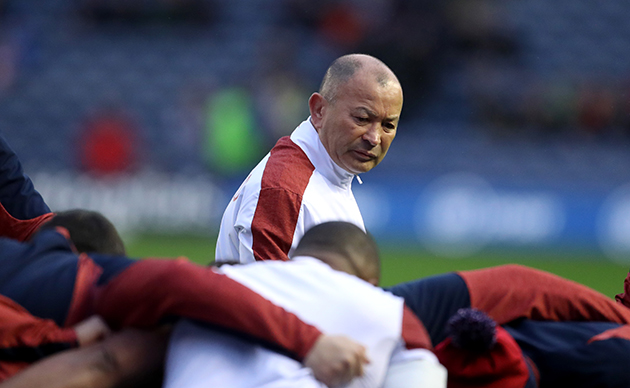From Eddie Jones’s big calls to the influence of Antoine Dupont, Jacob Whitehead reflects on the latest championship action
Eddie Jones got big selection calls right
Eddie Jones has copped a lot of flak over the past week. England’s loss to France in the opening round of the Six Nations has been blamed variously on his selection of Tom Curry at No 8, his incitement of the French team before the game and his failure to psychologically prepare his players to bounce back from a World Cup final defeat.
Whether Curry will ever flourish at the base of the pack remains to be seen, but Jones was criticised in the build-up to the Scotland game for not picking any back-three replacements. What if a winger gets injured?
However, the six-two split between forwards and backs was crucial, allowing Jones to name Joe Launchbury, Courtney Lawes and Ben Earl on the bench. Launchbury shored up the lineout in awful conditions, Lawes’s physicality was a second force of nature, while Earl hit two beautiful lines and helped pull over Ellis Genge for the vital score.
New Welsh style is already apparent
Wales under Warren Gatland were built on gain-line dominance, fitness and defensive organisation. Their half-backs made very few mistakes, and at the same time took fairly few risks.
Wales’ loss to Ireland in Dublin this weekend seemed to show quite clearly a change of style. They offloaded 13 times against Ireland, including a couple of sensational passes to set up Tomos Williams’s score. It was entertaining, attacking rugby, with the props in particular demonstrating some hitherto unseen handling skills.
However, Wales were also culpable for a series of mistakes that led directly to tries – poor tackling for Jordan Larmour’s score, two sloppy lineouts and over-ambition when running the ball out from defence for Andrew Conway’s try. They also threw ten bad passes – a new term in post-match statistics! – compared to zero from Ireland.
Wayne Pivac’s Scarlets won the Pro12 in 2017 with this all-court style, as they slowly upskilled to cut out the mistakes and learnt the right areas of the field to take risks in.
Wales are only at the beginning of a World Cup cycle – it will be exciting to see how they develop over the next four years.
Is this the tournament of the back-row?
The first six games of the Six Nations threw up a remarkable statistical anomaly, with the Man of Match award given on each occasion to a back-rower.
Justin Tipuric, CJ Stander, Gregory Alldritt (both twice!) and Sam Underhill have all won the post-game gong, primarily (with the possible exception of Underhill) for the excellence of their breakdown work.
What does this tell us? Are we finally recognising the importance of the breakdown as a specialist skill, something noted by Wales when they appointed Sam Warburton as a dedicated breakdown coach?
Or is it because more teams are now spreading their fetchers across the field rather than asking them to chase the ball around the park, resulting in speedier and more impactful involvements?
Antoine Dupont takes France to another level

Fast mover: Antoine Dupont makes a break for France (Getty Images)
France have been well-known for producing incredible scrum-halves and Antoine Dupont looks poised to become the latest in that long line. He has been on the international scene for a couple of years, so his class isn’t so much something new as a talent realised – and his importance is growing.
Morgan Parra and Maxime Machenaud have previously offered excellent game management without the sniping threat of the traditional French petit-general, whereas Dupont has taken this French team to another level with his multi-talented skills.
The Toulouse half-back could arguably have been Man of the Match in each of France’s first two matches, with his looped pass to Gregory Alldritt the highlight of Sunday’s 35-22 win over Italy.
His importance to the team is such that it has freed up the raw Romain Ntamack to focus on his attacking game – a mantle taken up beautifully by the fly-half as he dummied and galloped through for the bonus-point try in the second-half.
Related: Toulouse trio Antoine Dupont, Romain Ntamack and Thomas Ramos
Another positive for France? Dupont and Ntamack’s replacements, Baptiste Serin and Matthieu Jalibert, were both equally box-office when they came on.
Blue skies shone despite the weather for les Bleus. Wales may well look to shut them out by closing the roof at the Principality Stadium in two weeks.
The Allan-Canna combination gives Italy some attacking identity
For a long time, Italy have relied on power and territory to score tries, occasionally being blessed by the occasional piece of magic from Matteo Minozzi or opportunism from Michele Campagnaro.
Conditions were difficult in Paris, but Italy still showed attacking ambition. Coach Franco Smith has picked fly-half Carlo Canna at inside-centre for the first two rounds, pairing him with the underrated Tommaso Allan, giving Italy two distributors for the first time since Andrea Masi’s retirement.

Fine line: Tommaso Allan has been playing close to the gain-line (Getty Images)
When Italy attacked well, their forwards won very quick ball and Allan stood extremely flat, always a threat to jink inside or put his outside man through a hole.
Playing this close to the gain-line means that the fly-half is always at risk of being caught up in the breakdown, but Smith’s selection of Canna meant that the 12 is able to step in at first receiver at the next phase, meaning Italy’s attacks lost none of their momentum.
Italy were sometimes guilty of overplaying, whilst the handling of their forwards left a lot to be desired. Nevertheless there were real moments of excitement out wide for Minozzi and Mattia Bellini. Hopefully when Smith’s interim reign ends the new coach will share his ideals.
The March issue of Rugby World magazine – a Six Nations special – is on sale now.
Follow Rugby World on Facebook, Instagram and Twitter.





